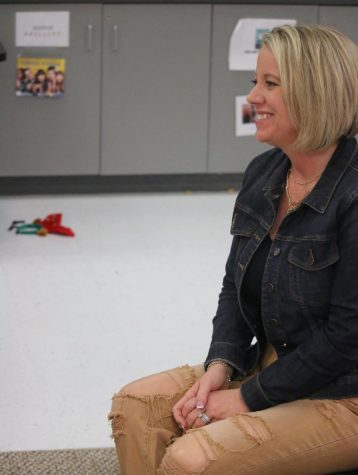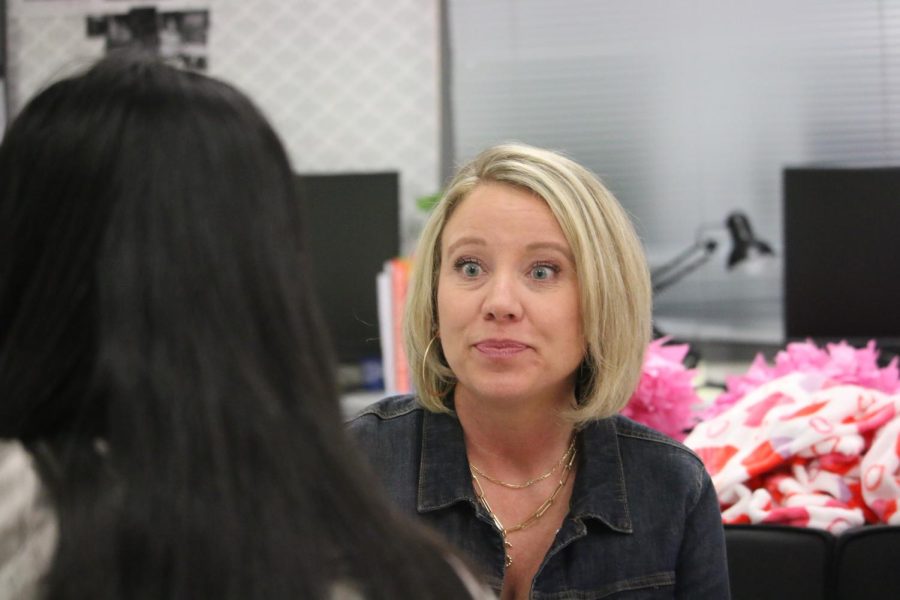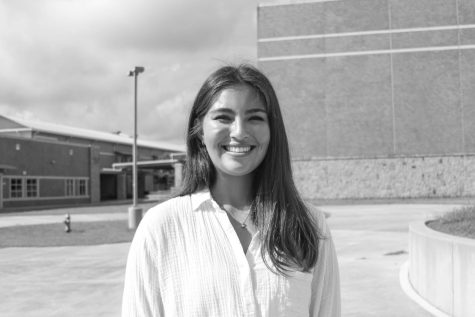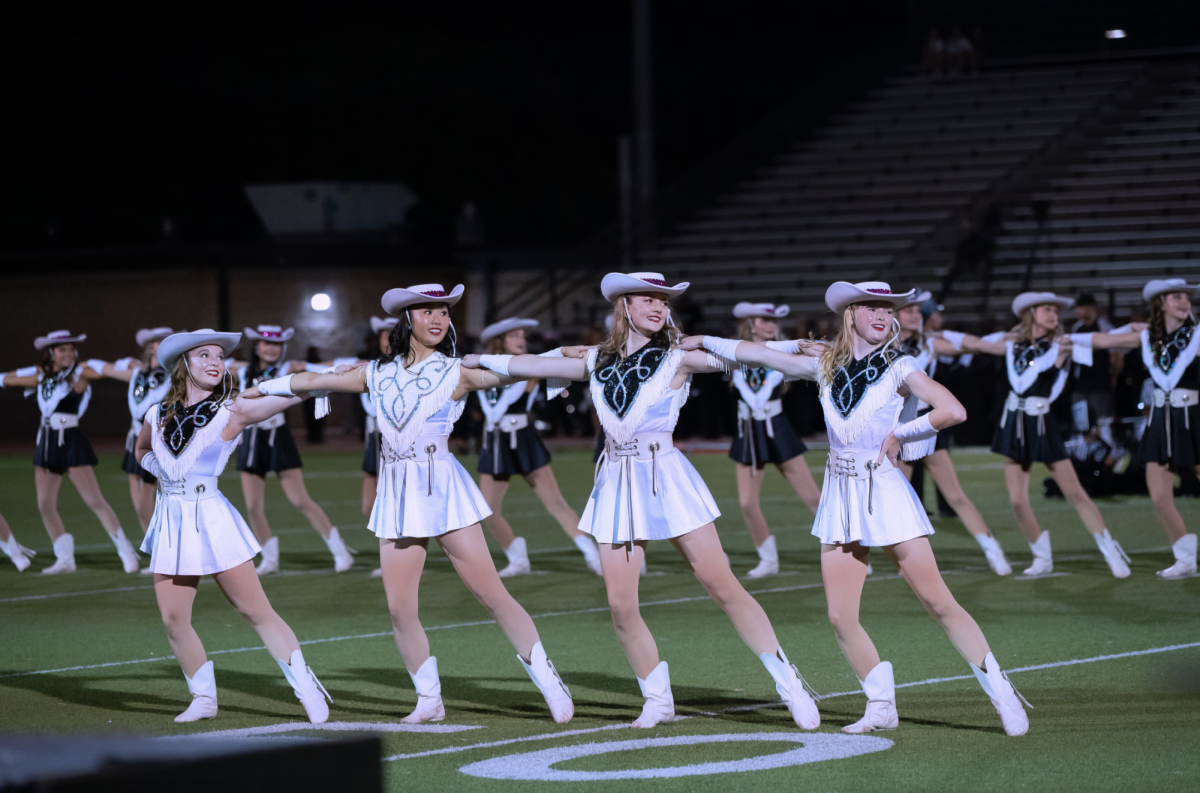Powell’s passion: a counselor spotlight
Mrs. Powell chats with senior Sarah McKelvy about her class assignments and class anecdotes.
February 7, 2023
“I taught for 22 years before I became a counselor and then about year 15 I realized, I don’t like the teaching part. I like the relationship part.”
Shawna Powell started counseling in 2020, and only got to know her students for a few months before COVID destroyed campus life as we knew it for over a year.
“I didn’t know any of the teachers, because we just sat there with all the doors closed.” Powell said. “All of our staff meetings were Zooms, it was a struggle.”
This didn’t hinder Powell’s passion for student connection; instead, she powered through the tough virtual year and went in to the 2021-2022 school year impatient to rekindle those student relationships.
“My favorite group are freshmen, my first year freshmen were online, but now they’ll be my first group to see all the way through.” Powell said. “And now I’m seeing how far they came from when they were little babies on a zoom screen to them getting their driver’s licenses.”
Despite her job title, Powell spends less time counseling students in her day to day schedule. Her daily functions usually consist of scheduling, transcript assistance, staff meetings, and behavioral incidents. Most of which were not in the job description she was expecting.
“I didn’t go to transcript school, I’m not analytical like that either.” Powell said. “I went to mental health school, so just sitting and getting to know students is the part that I like best.”
Before counseling, Powell taught 5th grade language arts for years. When she met a student having separation anxiety from their mom at school, the school counselor told her she was eligible for a career change that would specialize in her obvious talents.
“I kind of helped talk her through that [anxiety], and both parties were very appreciative.” Powell said. “So when someone said I’d be good at it, that’s flattering, and I was like ‘Ok maybe I’ll try it’.”
Now, Powell gets to build relationships with students as part of her job. She loves to meet new students, but meeting them isn’t usually under the best circumstances.
“We don’t get to know the students who are just performing happily and content with their lives.” Powell said. “We get to know the students with struggles, which is why we’re here.”
Powell’s mastery comes in helping students navigate adolescence in social challenges, varying moods, and even struggles at home. Powell hopes to be the adult voice in students’ lives for those that might find listening to their parents difficult.

“My own children never listened to me.” Powell said. “So if I can word something differently, and listen to students a little better, I can help that way.”
When students come to counselors with an issue there’s an order to follow. Listening first, then looking at the problem for a desired outcome.
“What’s the goal? What would make this situation better for you?” Powell said. “My job is helping you get back to class, and what is it going to take to help get you through this day?”
A few weeks ago a 2022 graduate, Graylan Spring, passed away. The grief was felt all over campus. When tragedies like this strike, counselors like Powell have a team on standby to help students and faculty at that time.
“Anything that brings out your mortality and puts it in your face is really scary.” Powell said. “It can be really traumatic because it could be someone you knew or simply stood next to you.”
LISD has social workers for this reason. In the event of a large-scale tragedy, a district team will come and work with the counselors to aid a large group of students that might be struggling with it. Much of this is due to counselors dealing with their own grief.
“Counselors know their students and they might be more comfortable processing that with their own Alpha counselor that they’ve known for a couple of years.” Powell said. “Those counselors may know that student too, and it’s not okay for them to also have to process their own grief.”
Here on campus, Powell knows most students are smart and good at taking care of themselves. Many students know when to get help and how to do it. But those few that don’t usually stem from a stubbornness that follows them from home.
“I think there’s still a little bit of a stigma about asking for help.” Powell said. “Some families are just designed to push it down. ‘You don’t have anything to be sad about’ and ‘how can you be anxious?’ as parents, we’re moving away from that a lot.”
The consistent enemy counselors face isn’t any mental or social issues, it’s time. Now, each counselor has about 400 students under their alpha sorter; meaning they are very limited on meeting times and spontaneous availability.
“We had eight counselors last year and then we had to cut back because the student body went down about 75 kids.” Powell said. “We need more face time so they get to know us and trust us, and then they’ll come to us.”
Powell loves her job, despite the constant email for recommendation letters or transcripts, she just wishes she got to see more students daily. She’s not worried too much about our mental health though, that seems to be a less constant struggle.
“I found that they have friends who do and aren’t afraid to say, ‘Hey, I’m worried about this person’ and I can check on them. ” Powell said. “Because you guys look out for each other.”







